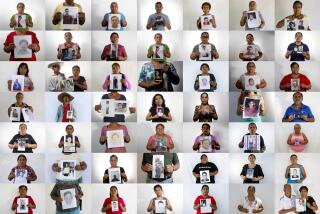Mexico’s drug war disappearances leave families in anguish
They had scraped together money for a vacation in the port city of Veracruz. Four couples, owners of small fruit and taco shops, from the quiet state of Guanajuato.
After checking in to their hotel and spending the day by the pool with their children, the husbands wandered off, still in their shorts, to buy ice at a nearby 7-Eleven. Maybe they decided to pop into a bar, one the hotel guard recommended.
At first, the wives weren’t too worried when the men didn’t come back. Even the next morning, the women figured they had tied one on and slept it off somewhere. They took their children on a tour of the city. But by nightfall, the wives became nervous, and as cellphone calls went unanswered, they became terrified.
Where were their husbands?
That was nearly a year ago. The four men have not been seen since. Their families have received no ransom demand, no information, no clues whatsoever. Their bodies have not turned up.
“It was as if the earth swallowed them,” one of the wives said in an interview.
In a chilling byproduct of the drug war raging in Mexico, thousands of people have disappeared. Not killed, as far as is known; not taken for ransom. Simply vanished, leaving families desperate and broken, and a society confused and frightened.
Some are low-level drug gangsters “lifted,” to use the local vernacular, by rivals, then killed and dumped in secret mass graves. Some are last seen in the hands of the military or police, picked up for questioning, fates unknown. Thousands of others are immigrants who can’t pay their smugglers.
And some, in the most unsettling instances, disappear for reasons no one can fathom.
Families tell themselves their loved ones were taken by traffickers and forced into slave labor in marijuana fields and methamphetamine labs. It may be true in some cases, but more often it is a form of self-deluding comfort.
The disappearances are a disturbing echo of a tactic employed by dictatorships in the so-called dirty wars that plagued parts of Latin America in the last half of the 20th century.
Whether practiced by governments or by criminals, it is a form of control and intimidation that in some ways has an even more profound effect on society because it is an “ambiguous loss,” said psychologist Carlos Beristain, a Spaniard who has counseled families of the missing throughout the region.
Few cases are ever resolved, with authorities overwhelmed by record-high killings. Senseless brutality engulfs families in uncertainty, leaving them unable to mourn, unable to move on. It is a wound, as many put it, that does not stop bleeding.
A state of limbo
The couples who traveled to Veracruz were on a long-anticipated vacation last May, with 10 children among them, staying at the Howard Johnson hotel in the lively port city and popular tourist destination. The men were in their late 30s, early 40s. They were wearing shorts, sandals and the red wristbands that showed they were hotel guests when they ventured out that last night.
“We never imagined it would be dangerous,” one of the wives said. She asked her name not be published out of reluctance to antagonize authorities who initially showed interest in the case but have since moved on to other crimes, including more than 300 other disappearances in Veracruz.
Their wives frantically searched for them in the days that followed, driving all over the city, reporting to every police station, the Red Cross, hospitals, the military and the local television station. They dialed their husbands’ cellphones, but there were no answers. Weeks turned to months. Nothing.
The only clue came when one of the men’s ATM cards was used two days after the disappearance. And someone told them the bar that the men might have gone to, New Fantasy, was a den of danger, full of “narcos.”
Reyna Estrada’s husband vanished with 11 others two years ago when they were on a trip to the northern border state of Coahuila to sell paint.
She says the families have been left in a state of limbo.
“You aren’t a widow. You aren’t a wife. My husband simply is not here,” she said. “You cannot mourn.”
Estrada’s husband, Jaime Ramirez, traveled with the 11 other men from their homes in the state of Mexico, a couple of hours outside Mexico City, to a small Coahuila town called Piedras Negras. Vendors of house paint and other construction supplies, they were on a sales trip, traveling in two vans. Ramirez was 48; the eldest was 50 and the youngest 16, helping out his uncle.
They were last seen late one night at a gasoline station, not far from a military checkpoint. Coahuila has been quietly seething with drug violence for some time, especially as the paramilitary drug gang known as the Zetas takes over part of the state.
Relatives have repeatedly traveled to the area in an attempt to find out more, but to no avail. No witnesses have come forward, and one human rights activist warned they risked being killed if they pried too far.
“How can 12 people go missing, get rounded up, whatever happened, and no one notices?” Estrada said. “At least when your loved one dies, you know where they are, what happened, you can eventually get used to it. We do not know what monster we are fighting.”
Little help from police
Authorities frequently try to stigmatize the victim, said Blanca Martinez, a human rights activist who has helped organize families of more than 100 missing people in Coahuila. They suggest the victim ran off with a girlfriend, went to work illegally in the United States or hooked up with the lucrative drug business.
Some Mexicans may have “disappeared” as matters of mistaken identity. A group of 10 hunters from the Guanajuato city of Leon went on a seasonal hunting trip Dec. 4 in Zacatecas, in search of rabbits, deer and wild boar. They had a few rifles and a red SUV and one wore camouflage. According to the testimony of one member of the hunting party who managed to escape, the group was intercepted by local police who handed them over to about 15 masked gunmen dressed in black.
With the exception of the man who escaped, the hunters remain missing.
Two months earlier, 20 young men from Michoacan went on what their families described as a vacation to Acapulco. They were seized by gunmen and remained missing for weeks. Their bodies were eventually discovered in a mass grave, and their purported killers confessed that the men had been mistaken for a rival gang from Michoacan.
Several drug-gang gunmen captured by authorities have recounted how they disposed of bodies en masse in remote, hidden graves. And in one particularly grisly case, a henchman for the Sinaloa cartel in Tijuana said he dissolved about 300 bodies using acid. Police searching his property found traces of human remains last month.
More than 11,000 migrants, primarily from Central America, went missing last year crossing Mexico on their way to the United States, according to the Mexican National Human Rights Commission. Most were captured by drug gangs demanding payoffs. Many remain missing. In the single largest massacre in Mexico’s four-year conflict, 73 immigrants who refused to work for their captors were slain last summer.
In early 2009, Pablo Esparza was dragged from his mother’s home in the Durango city of Cuencame. A few weeks later, his brother and sister were seized by gunmen armed with cattle prods. Then the police commander investigating the disappearances vanished. They were among about 60 people who went missing in 2009 just in Cuencame, a town of fewer than 10,000 people along a Zeta infiltration route.
Another Esparza brother, Jose de Jesus, is a U.S. citizen from Texas. He has pressed both U.S. and Mexican governments to investigate the case. But, nearly two years later, there is no trace of his absent family. One theory is they may have fallen prey to drug traffickers avenging actions by other, distant relatives.
“I live for the day they will reappear,” Jose de Jesus Esparza said in a telephone interview from San Francisco, where he works for an airline. The uncertainty has taken its toll: What remains of his family is falling apart. Their mother has attempted suicide, the children fall ill, family members have sunk into deep depression, and Jose de Jesus is going bankrupt in his attempts to find his missing relatives.
“A lot of time has passed, but I haven’t stopped looking a single day,” he said. Hope, he says, is the last thing that dies.
More to Read
Start your day right
Sign up for Essential California for news, features and recommendations from the L.A. Times and beyond in your inbox six days a week.
You may occasionally receive promotional content from the Los Angeles Times.







